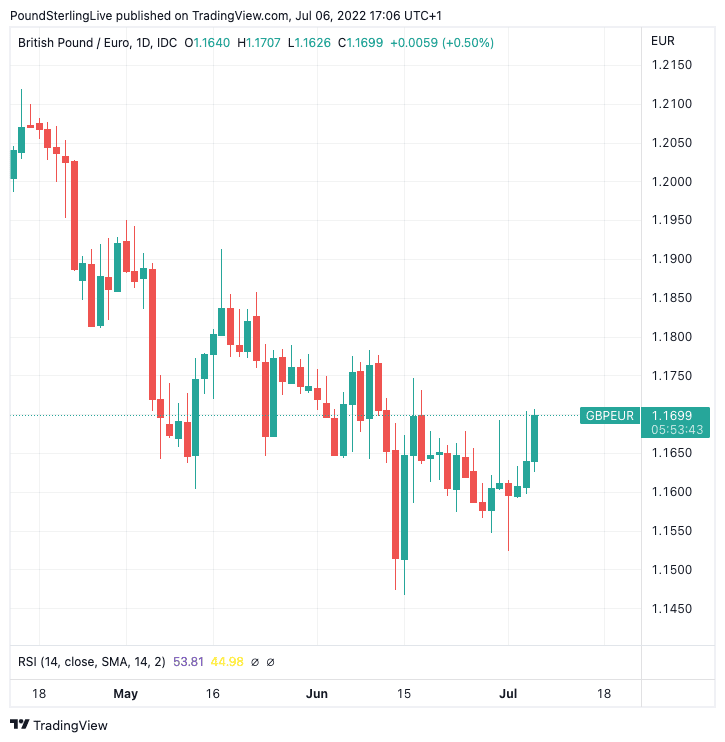Pound Sterling's Outlook Brightens as Johnson Resigns
- Written by: Gary Howes
- GBP supported as Johnson resigns
- But there are some benefits to GBP of current political turmoil
- Short-term economic boost if Johnson cuts taxes
- A new leader can boost participation rate
- And raise longer-term economic growth trend

Above: File image of Prime Minister Johnson, by Andrew Parsons / No 10 Downing Street.
Boris Johnson is will resign as the Prime Minister of the United Kingdom today having lost the support of his party.
Pound Sterling is rallying at the time of writing although it is hard to ascertain just how much of the move is linked to the domestic political news or the broadly supportive global market backdrop of the day.
"Sterling began to rise as soon as the Prime Minister indicated he would finally leave office but, as is so often the case, a little initial euphoria could give way to the more mundane, cold, hard realities of the current economic malaise, which could let a little air out of the balloon," says James Bentley, Director of Financial Markets Online.
Regardless, Investors will be asking what the change in Downing Street means for the Pound and the general UK economic outlook and a number of analysts we follow are leaning towards the positive.
Samuel Tombs, Chief UK Economist at Pantheon Macroeconomics, says if a new Conservative leader proves to be more open to striking a deal with the EU over the matter of Northern Ireland it could benefit the UK economy as he expects it to facilitate a recovery in business investment and exports.
Beyond EU relations, "the medium-term economic outlook might brighten slightly if a new leader takes greater interest in structural reforms that could increase the economy’s trend growth rate," says Tombs.

Above: The Pound is up against the Euro amidst ongoing political intrigue.
By way of example Tombs observes that during Theresa May’s leadership childcare funding was increased substantially, boosting the participation rate among parents of young children.
Another structurally beneficial policy was the increase in the state pension age during the 2010s for women to 66, from 60, and for men to 66, from 65.
"Right now, the current government has no policies of note to raise the participation rate, despite the economic problems recently presented by a contracting workforce," says Tombs.
Compare Currency Exchange Rates
Find out how much you could save on your international transfer
Estimated saving compared to high street banks:
£2,500.00
Free • No obligation • Takes 2 minutes
The labour market matters as since Covid the UK participation rate has fallen sharply as workers have opted for earlier retirement, foreign workers have left the country and long-term illness has increased.
If a new government can tackle these issues and increase the participation rate Pantheon Macroeconomics would be inclined to raise their forecasts for trend economic growth.
Their calculations suggest trend growth has slipped from 1.75% in the 2010s to 1.25% at the current time.
This could only be a positive development for the battered Pound over the longer term.
Nearer-term it appears that the Conservative Party are agitating for the tax hikes put in motion by the previous Chancellor Rishi Sunak to be reversed or cancelled.
Sunak's short-lived replacement Nadhim Zahawi meanwhile agitated for significant pay increases for teachers while holding the education brief, suggesting scope for increased spending.
Pantheon Macroeconomics says a fiscal boost would mean they raise the number of Bank of England interest rate hikes they see in the pipeline.
Higher Bank of England interest rates can be supportive of the Pound but only IF these rates are a function of improved economic growth rates.
Therefore a new pro-growth administration would benefit the Pound and the policies proposed by the field of contenders to replace Johnson will be watched keenly.
At the time of writing the spot Pound to Euro exchange rate is quoted at 1.1757, bank accounts are offering in the region of 1.1430 for international payments will independent providers are quoting closer to 1.1720.
The Pound to Dollar exchange spot rate is at 1.20, meaning bank payment rates are close to 1.1578 and independent providers are closer to 1.1960.
"The pound hit a session high following the announcement, clearly pleased that Boris Johnson won’t try to rule the country with such dwindling support and relieved that he hasn’t gone down the route of a snap election," says Fiona Cincotta, Financial Market Analyst for City Index.
"However, this latest political earthquake could keep the pound under pressure over the coming weeks. More uncertainty at a time when Brexit relations are dire, and the cost of living crisis is set to intensify could see the pound fall back below 1.19; the upside potential of GBP/USD seems very limited," she adds.
Compare Currency Exchange Rates
Find out how much you could save on your international transfer
Estimated saving compared to high street banks:
£2,500.00
Free • No obligation • Takes 2 minutes




